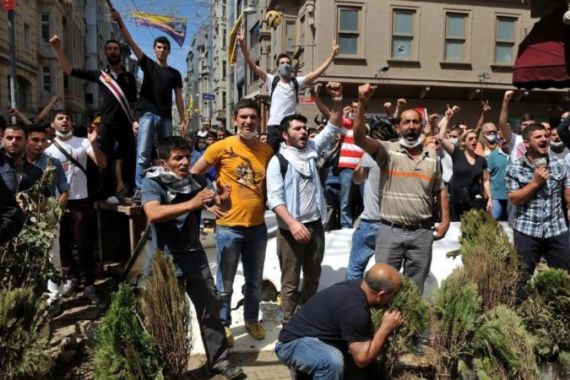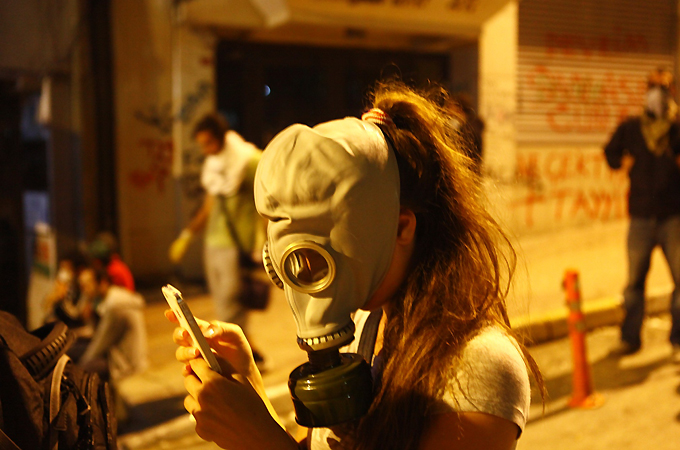Tweeting Turks sidestep mainstream media
PM calls social media “the worst menace to society” as Turks organise protests and break news stories using Twitter.

Istanbul, Turkey – Taksim Gezi Park is one of the few green spaces in the heart of Istanbul. Recently, the park and its 606 trees were slated to be levelled to pave the way for a shopping mall complex – the latest step in Turkey’s construction boom.
But something unusual happened on May 28: Sirri Sureyya Onder, a member of parliament from an opposition party, joined campaigners staging a sit-in at the park, stood in front of a bulldozer and saved a tree. The crowd grew larger, and some protesters set up an encampment.
On May 31, police raided the park and used tear gas to disperse the protesters, prompting harsh criticism of the Turkish government and its ruling Justice and Development (AKP) party. The uprising has now spread to dozens of cities across Turkey.
As in the Arab Spring and the 2009 Iranian elections, protesters in Turkey used Twitter to communicate and organise demonstrations. A few hours into the protests, Twitter users had sent two million tweets with hashtags related to the park. At one point, thousands of people – organised through Twitter – crossed Istanbul’s Bosphorus Bridge on foot to reach the park.
Turkish Prime Minister Recep Tayyip Erdogan was none too pleased with Twitter’s role in the protests, declaring that social media was “the worst menace to society”.
Another parliamentarian agreed with Erdogan’s social media assessment.
“The prime minister’s words weren’t enough to describe what a disgrace Twitter is,” Mehmet Metiner, an AKP lawmaker, told Al Jazeera.
“I believe that Twitter is very dangerous for the peace and democracy process in Turkey. It helps spread many lies and it’s impossible to prevent it. I believe that social media should be regulated according to law.”
Alternative news source
|
Ongoing Turkey protests turn violent |
Twitter has become a useful source of news for the Turkish public in recent days – and months. The protests have largely been untelevised, with some of Turkey’s news networks airing cooking shows and penguin documentaries at the height of the tensions.
Over the past few years, Twitter has emerged as an alternative to the mainstream media in Turkey, which critics say is often pressured by the government. In 2009, for instance, Dogan Media Group, Turkey’s largest, was hit by a $2.5bn tax fine – a move that also intimidated other Turkish media organisations.
Government supporters, however, reject accusations that it has exerted control over Turkish media.
According to March 2011 data from comScore Media Metrix, which monitors internet traffic, 16.6 percent of internet users over the age of 15 use Twitter in Turkey, and the country ranked eighth in internet penetration for Twitter.
The social media site is especially useful in spreading breaking news in Turkey. When a botched military operation resulted in the deaths of 35 Kurdish civilians in Uludere, a province in southeastern Turkey, the news first broke on Twitter.
“I heard about it and mentioned it in my TV programme, but my broadcast was later interrupted because we were under strict orders from the government to not utter it until an official announcement was made,” said Aysenur Arslan, until recently a news anchor for CNN Turk. That day it took traditional news organisations 16 hours to report the story.
But an independent journalist, Serdar Akinan, was already in the area tweeting photos and videos. “I used my iPhone to shoot videos and conduct interviews,” Akinan said. “I was the first to share photos from the funerals. Mainstream media used my Twitter content to cover the story without my permission.”
Akinan, who said he has since been fired from a newspaper for his strong criticism of the government’s Kurdish policy, now only carries out journalism on Twitter. “I can reach more than 150,000 people at any moment and it is an influential outlet. And it will be more effective in the future.”
During the odatv.com investigation in 2011, in which 13 journalists were arrested for allegedly plotting a coup to overthrow the government, the mainstream media shied away from reporting the case. But seven independent journalists, as well as the defence lawyers, began live-tweeting the trials. Their tweets were aggregated and spread by other journalists, making it impossible for the traditional media to ignore.
“Ahmet Sik and Nedim Sener [two of the arrested journalists] were my friends and I started tweeting to inform the world about their wellbeing,” said Elif Ilgaz, an independent journalist who organised live-tweeting from courtrooms.
 |
| A protester punches a message into her phone [Huseyin Narin/Al Jazeera] |
“I’d noticed a friend of my mine live-tweeting from a courtroom before, and later the two of us covered the odatv.com trials on Twitter. By the second trial we were more organised and delegated the tasks. One group was tweeting in Turkish, another in English.”
#OccupyGezi
The same system was adapted during the Gezi Park protests. Many Twitter users tagged posts about the protests with the #direngaziparki hashtag, while journalists and academics #OccupyGezi to inform world media of the protests. Along with photos and videos, wi-fi passwords were distributed by Twitter. Calls for food and water and contact information for lawyers and doctors were also spread on the social media site.
“Twitter can be particularly useful in a country where people are suspicious of the legacy media, because one has immediate access to non-mainstream websites, academic and specialised blogs, and on-the-ground reports that don’t show up in papers or on TV,” explained Benjamin Harvey, Bloomberg’s bureau chief in Turkey. “You also see what opposition politicians and analysts who don’t get a lot of face time in the press are thinking.”
Yet Harvey noted: “We’ve also seen from certain high-profile cases that expressing opinion on Twitter or Facebook isn’t free from prosecution by authorities in Turkey, so one senses a degree of caution even there.”
Ilgaz said media bosses were increasingly monitoring their workers.
“Unfortunately the mainstream media organisations are limiting their employees activities’ on social media,” he said.
“We are coping with self-censorship since many journalists have been fired. Over 70 of them are arrested and this leads to reporters taking a step back.”
Follow Oray Egin on Twitter: @OrayinEnglish